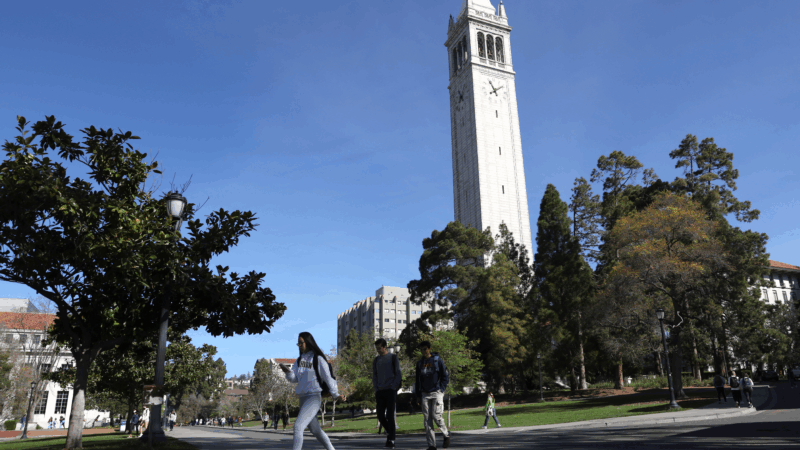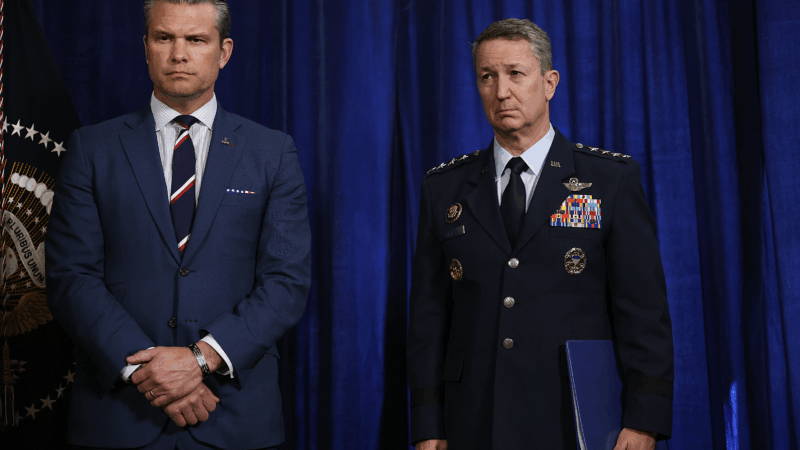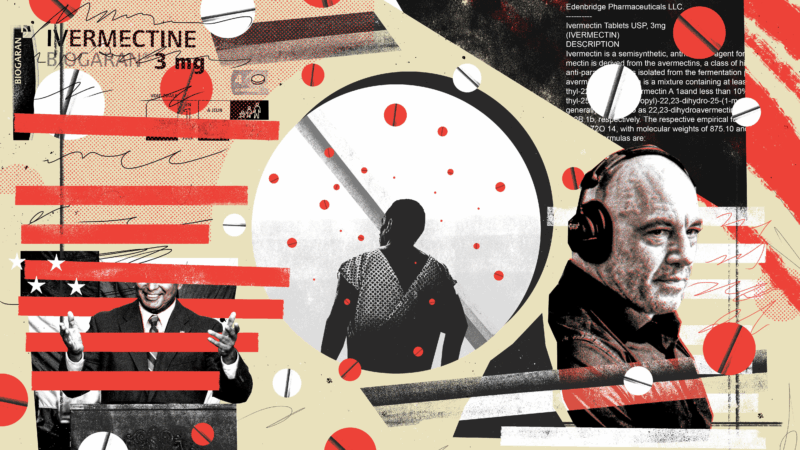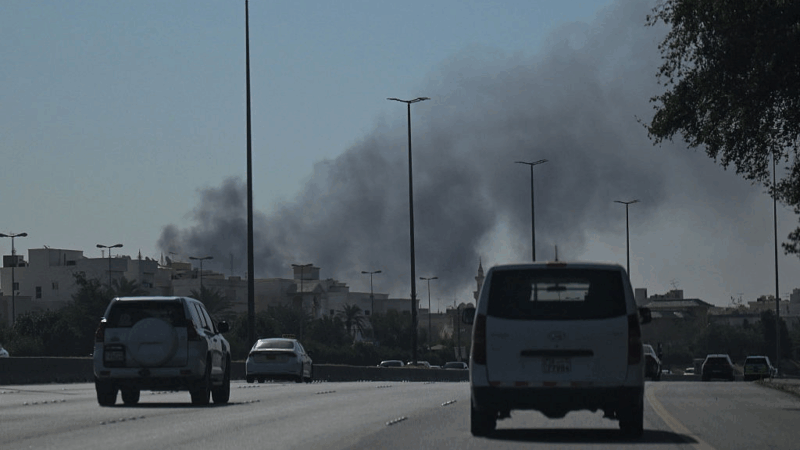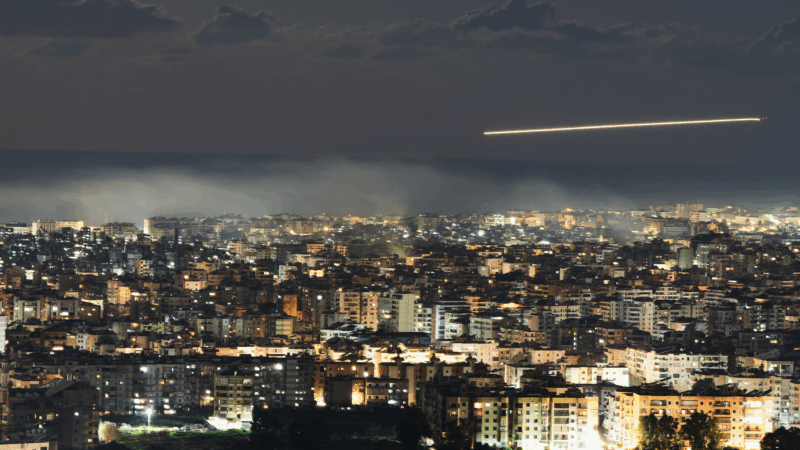UC Berkeley professor warns of ‘unprecedented crackdown’ on academic freedom
The University of California, Berkeley, is facing backlash after disclosing the names of 160 students, faculty, and staff to Trump administration officials as part of a federal investigation into allegations of antisemitism on campus.
The university sent the documents over several months and notified those named earlier this month. Among them is Ussama Makdisi, a history professor and leading scholar of modern Arab history.
“The idea is obviously, clearly a chilling of speech and a chilling of academic freedom because we have no idea what we have allegedly been accused of. We have no idea how to even go about clearing our name,” Makdisi said.
In a statement to NPR, University of California, Berkeley, spokesperson Janet Gilmore confirmed that records of complaints about “alleged incidents of antisemitism and discrimination” were provided to the Office for Civil Rights at the Department of Education.
The disclosure comes as the federal government continues its campaign to investigate elite universities, launched after campus protests over Israel’s war in Gaza. Critics say the investigations are weaponizing the charge of antisemitism to stifle academic freedoms.
On Tuesday, a U.N. commission said it found that Israel has committed genocide in the Gaza Strip, a charge Israel has denied.
In an interview with NPR’s Leila Fadel, Makdisi discussed academic freedom, censorship and campus climate.
This interview has been edited for length and clarity.
Interview highlights
Leila Fadel: How much do you think this has to do with what you teach? You teach history. You touch on the Israeli-Palestinian conflict. You’ve criticized Israeli policies.
Ussama Makdisi: I teach Palestinian history, I teach Middle Eastern history, I teach Arab history. And, of course, this has to do with… I mean, what’s happening across American institutions and across the United States more generally is a crackdown, an unprecedented crackdown, on academic freedom, on the ability of students to express themselves in support of various very basic and fundamental issues, such as freedom, such as equality, such as justice for Palestinians in particular.
Fadel: Campus spokesperson Janet Gilmore for Berkeley told us it wasn’t a “list of names” per se. Rather, the Department of Education is investigating how Berkeley handles allegations of antisemitism. The University of California had a legal obligation to cooperate. And it has cooperated over the years and across administrations. It sent documents, and it informed people if their names were in the documents. The university also said “We are committed to transparency and supporting our campus community while complying with federal investigations.” What do you think of that statement?
Makdisi: I mean, let’s see what happens. All I can say is that when you have some sort of information that’s been turned over to an administration that has actively persecuted students across this country for the fact that they have expressed themselves. In fact, these students, as far as I’m aware, the cases against them didn’t hold up.
Fadel: As a historian, does this moment remind you of any other time in history?
Makdisi: Yes, it reminds me of the McCarthyist period. It reminds me of the Salem Witch Trials. It reminds me of all sorts of things as a historian. But the difference, of course, is that this is all happening in the context of what is going on in Gaza. There is a genocide taking place in Gaza now. Again, the point of a university, ideally, is that we can come and we can have a discussion. We can debate the history, and points about history, the points about politics, points about policy, and that is exactly what is under threat right now.
Fadel: And what happens if there is not a free exchange of ideas on campus, if that changes?
Makdisi: I mean, we’re going to find out very soon. We are in a crisis moment right now.
Fadel: You mentioned genocide. A United Nations Commission of Inquiry just concluded that Israel is committing genocide in Gaza, but it’s something Israel still denies. Are you surprised that Berkeley, of all places, with its reputation as this sort of bastion of liberalism and exchange of free ideas, is handling the investigation this way?
Makdisi: I think Berkeley administration is under huge pressure. It’s quite clear. On the other hand, yes, I am dismayed by what has happened to our students. I’m dismayed by what’s happening to the campus climate in terms of being able to speak out about basic issues. We should all be able to teach our subject matters with freedom and without censorship. And, of course, every student should have the right to learn without censorship and with freedom.
This article was adapted for the web by Majd Al-Waheidi and edited by Obed Manuel.
Transcript:
LEILA FADEL, HOST:
We have the latest in the tug-of-war between the Trump administration and schools it’s investigating over allegations of antisemitism. Investigations critics say weaponize the real issue of bigotry, to suppress academic freedoms on college campuses. Now, the University of California, Berkeley, is handing over files and names to the federal government.
It informed about 160 faculty, staff and students this month that their names were included in records the school gave to the Department of Education. Among them is history professor Ussama Makdisi.
USSAMA MAKDISI: I was shocked and I felt dismayed, as I think most people would be, and we felt a fundamental and breathtaking breach of trust and fairness.
FADEL: In a statement to NPR, university spokesperson Janet Gilmore confirmed that records of complaints relating to, quote, “alleged incidents of antisemitism and discrimination” were provided to the Trump administration. I asked Makdisi what effect the move is having on campus.
MAKDISI: The idea is obviously clearly a chilling of speech and a chilling of academic freedom because, of course, we have no idea what we have allegedly been accused of. We have no idea how to even go about clearing our name.
FADEL: How much do you think this has to do with what you teach? I mean, you teach history. You touch on the Israel-Palestine conflict. You’ve criticized Israeli policies.
MAKDISI: I teach Palestinian history. I teach Middle Eastern history. I teach Arab history. And, of course, this has to do with, I mean, what’s happening across American institutions and across the United States more generally is a crackdown, an unprecedented crackdown, on academic freedom, on the ability of students to express themselves in support of various, very basic and fundamental issues, such as freedom, such as equality, such as justice for Palestinians in particular.
FADEL: A campus spokesperson for Berkeley told us it wasn’t a, quote, “list of names per se.” Rather, the Department of Education is investigating how Berkeley handles allegations of antisemitism. The University of California had a legal obligation to cooperate. It sent documents and it informed people if their names were in the documents.
So this is what they told us, and then said, quote, “we are committed to transparency and supporting our campus community while complying with federal investigations.” What do you think of that statement?
MAKDISI: I mean, let’s see what happens. I mean, what can I say? I mean, that is going to be in their statements. All I can say is that when you have sort of information that’s been turned over to an administration that has actively persecuted students across this country for the fact that they have expressed themselves, and you know, and in almost every case, in fact, these students, as far as I’m aware, the cases against them didn’t hold up.
FADEL: As a historian, does this moment remind you of any other time in history?
MAKDISI: Yes, it reminds me of the McCarthyis period and it reminds me of the Salem witch trials, it reminds me of all sorts of things as a historian. But the difference, of course, is that this is all happening in the context of what is going on in Gaza. There is a genocide taking place in Gaza. Now, again, the point of a university, ideally, is that we can come and we can have a discussion.
We can debate what, you know, the history and points about history, the points about politics, points about policy. And that is exactly what is under threat right now.
FADEL: And what happens if there is not a free exchange of ideas on campus, if that changes?
MAKDISI: I mean, we’re going to find out very soon. We are in a crisis moment right now.
FADEL: And I will say, I mean, you mentioned genocide. The United Nations, a commission of inquiry just concluded that Israel is committing genocide in Gaza, but it’s something Israel still denies. Are you surprised that Berkeley, of all places, with its reputation as this sort of bastion of liberalism and exchange of free ideas, is handling the investigation this way?
MAKDISI: I think Berkeley administration, you know, is under huge pressure. It’s quite clear. On the other hand, yes, I am dismayed by what has happened to our students. I’m dismayed by what’s happening to the campus climate, in terms of being able to speak out about basic issues. We should all be able to teach our subject matters with freedom and without censorship.
And, of course, every student should have the right to learn without censorship and with freedom. It’s as simple as that.
FADEL: Ussama Makdisi is a professor of history at the University of California at Berkeley. Thank you so much for your time.
MAKDISI: You’re very welcome.
Hegseth: ‘We didn’t start this war but under President Trump we’re finishing it’
The remarks are the first to reporters since the U.S.-Israeli military operations against Iran began Saturday despite weeks of talks designed to stave off a conflict.
Ivermectin is making a post-pandemic comeback, among cancer patients
The anti-parasitic drug became a household name during the COVID-19 pandemic, and it is now being embraced as an alternative treatment for cancer. It is as politically polarizing as ever.
Rep. Adam Smith on the U.S. strikes on Iran and the debate over Trump’s war powers
NPR's Leila Fadel asks Democratic Rep. Adam Smith of Washington, the ranking member on the House Armed Services Committee, about President Trump's unilateral authorization to strike Iran.
Iran war widens, threatening to engulf Lebanon
The war over Iran engulfed more of the Middle East and beyond on Monday as Lebanon's militant group Hezbollah responded to the killing of Iran's spiritual leader with its first attack on Israel in more than a year.
Peer pressure can make this clownfish change its stripes
Tomato clownfish, in response to an unpredictable world, appear capable of adjusting when they lose their stripes based on cues from other fish and their habitat, a new study in PLOS Biology finds.
Hezbollah strikes Israel as American and Israeli planes pound Iran
Iran and Iranian-backed militias fired missiles at Israel and Arab states, apparently hitting the U.S. Embassy compound in Kuwait, while Israel and the United States pounded targets in Iran on Monday.

